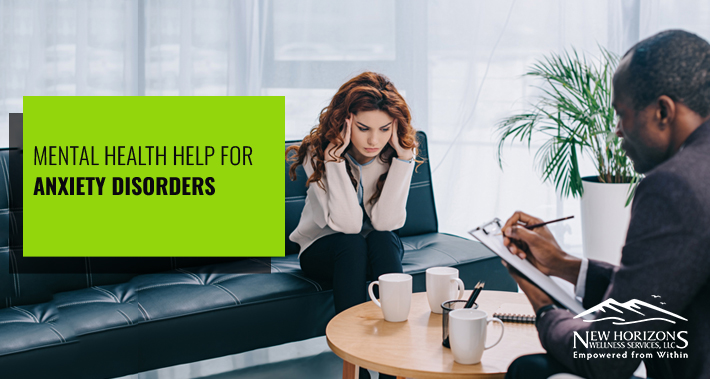
Have you ever experienced a knot in your stomach, sweaty palms, or a racing heart before a big test or interview?
This experience of occasional anxiety, especially around important situations, is normal.
We all experience these feelings from time to time.
However, if this experience of anxiety becomes an intense, persistent, excessive worry about everyday life events, you may be experiencing an anxiety disorder.
Anxiety disorders are one of the most common psychiatric conditions in the US.
In fact, 19.1% of U.S adults experienced an anxiety disorder in the past year.
This prevalence is higher for women than men.
These anxiety disorders can interfere with your day-to-day life by causing you to avoid the places and situations you fear.
There are many different types of anxiety disorders that consist of different potential symptoms and causes.
Whatever the type of anxiety disorder you may be experiencing, there is help available.
This help includes:
Let’s dive further into what anxiety is, how anxiety differs from an anxiety disorder, possible treatment options, and more.
What is Anxiety
Anxiety is a temporary feeling of dread, or uneasiness.
It’s the reaction that we all get from time to time when we’re experiencing a stressful situation.
This anxiety is normal, and it could even be beneficial.
For example, when you’re in a potentially life threatening situation, anxiety is what allows you to get to safety.
During this experience, you may start sweating or experience a rapid heartbeat.
This experience of anxiety is important for your survival.
All of this gets you to take action towards a positive outcome.
What’s The Difference Between Anxiety And An Anxiety Disorder?
Anxiety is a normal part of life, and usually does not interfere with a person’s day to day functioning.
It’s temporary in nature and involves feelings of uneasiness and dread.
When these feelings of dread or uneasiness get to the point where it’s out of proportion with reality, it could be an anxiety disorder.
Anxiety disorders are a type of mental health condition where a person experiences intense, excessive, and persistent worry about every day events.
This anxiety interferes with a person’s ability to function and complete activities.
A person may frequently avoid certain places and situations which may lead to having fewer opportunities compared to others.
For example, anxiety disorders are twice as common among those who are unemployed compared with the population at large.
This is different from more situation based anxiety.
Types Of Anxiety Disorders
There are different types of anxiety disorders that can have different causes and symptoms.
Oftentimes, when people refer to anxiety, they may be referring to a general anxiety, or generalized anxiety disorder.
1. Generalized anxiety disorder
is an anxiety disorder where a person experiences excessive worry about activities.
This excessive anxiety lasts for at least 6 months, and is out of proportion with the reality of the situation, and interferes with your functioning.
This is one of the most common anxiety disorders.
2. Separation anxiety disorder
usually occurs in childhood and is an excessive anxiety when separated from an attachment figure.
This anxiety is out of proportion with your developmental age.
Selective mutism is another type of anxiety disorder, despite not having “anxiety” in the name.
It also usually occurs in childhood and involves an inability to speak in certain situations, while speaking in others.
3. Specific phobia
is the most common anxiety disorder in the United States specifically.
It’s excessive anxiety around a specific object and actions to avoid this object.
Some phobias may be related to a traumatic event.
For example, vehophobia – fear of driving – may be related to experiencing or witnessing a particularly bad car accident.
Others are difficult to explain, like trypophobia – the fear of clusters of circles.
4. Social anxiety disorder
can be seen as a type of phobia as well.
In this case, it involves excessive worry about social situations and a fear about being viewed negatively, judged, or embarrassed.
Oftentimes, this fear about social situations and what could go wrong causes a person to avoid these social situations.
In any of these anxiety disorders, a person may experience a panic attack, which is an episode of intense anxiety and fear.
These episodes come on suddenly and go away within minutes.
With a panic disorder, a person experiences these panic attacks repeatedly.
There is also usually a fear around having another panic attack in the future as well.
Agoraphobia is a type of anxiety disorder that involves excessive fear and avoidance of situations where there is a potential to experience a panic attack and you can’t escape.
Anxiety disorders can also be named after their causes.
That includes substance induced anxiety disorder.
What Causes Anxiety Disorders?
There is no one clear cut cause for anxiety disorders.
An anxiety disorder can be caused by one or more issues, including:
- Traumatic life events
- Medication side effects
- Genetics
- Brain chemistry
- Stress
- Environment
RELATED: Occupational Therapy For Pediatric Traumatic Brain Injury
Anxiety can also be caused by an underlying health issue for some people.
If this is the case, your doctor may seek to treat the underlying medical condition that is causing your anxiety.
Some common medical causes for anxiety include:
- Heart disease
- Thyroid issues
- Respiratory issues
- Chronic pain
- Drug misuse
- Diabetes
Anxiety is also linked with, and can be caused by, sensory processing disorder.
Sensory processing disorder affects how your brain processes the information it gets from your senses.
It can make you over or under sensitive to inputs from one or more of your senses.
When you are hypersensitive and experience too much sensory input it can cause you to feel overwhelmed and experience sensory overload.
This may trigger anxiety in noisy or crowded spaces, for example.
You may experience highlighted emotions to the color or texture of a specific food or other sensory input.
In this case, these sensory processing issues may cause a heightened level of anxiety to these stimuli.
RELATED: Occupational Therapy Treatments For Kids With Sensory Processing Disorder

How To Tell If You Have An Anxiety Disorder?
If you are experiencing an anxiety disorder, you may have worry that is difficult to control and out of proportion to any actual threat.
As well, you may have some of the following symptoms:
- Feeling nervous or restless
- Feeling a sense of immediate danger or doom
- Increased heart rate
- Breathing rapidly
- Sweating
- Trembling
- Having trouble sleeping
- Trouble concentrating or thinking
- Appetite changes
- Gastrointestinal issues
- Feeling weak or tired
You may also find certain places or situations trigger your anxiety symptoms.
In that case, you likely avoid such situations.
Most importantly, these feelings last for longer than six months.
How Can Occupational Therapy For Anxiety Help?
An occupational therapist will work with you to reduce your anxiety that interferes with your ability to function.
There are a number of different techniques that an occupational therapist may use that can help you with the physical and mental symptoms of anxiety.
Relaxation techniques help with the physical symptoms.
An example of this is the 5-4-3-2-1 technique, where a person grounds themselves by using environmental stimuli.
For example, your occupational therapist may work with you to find:
- Five things you can see
- Four things you can touch
- Three things you can hear
- Two things you can smell
- One thing you can taste
Another technique involves self awareness of your anxiety.
You will discover what triggers your anxiety levels to become elevated and how to compensate for this.
Fatigue is common in anxiety.
For this reason, an occupational therapist can also help you with techniques to help you pace yourself so you can reduce your feelings of exhaustion.
Lastly, grading activities is another technique where a person may gradually work towards overcoming the anxiety by taking small, structured steps towards a fear object or situation.
No matter the technique, you will work with an occupational therapist to identify your goals and minimize anxiety’s impact on you.
How Can Mental Health Counseling For Anxiety Help?
Many people with anxiety disorders experience overwhelming emotions to certain situations.
These overwhelming emotions cause a negative reaction, which can result in avoiding the situation(s) causing these negative feelings or thoughts.
Psychologists are trained mental health professionals that can provide counseling to help.
They work with you to teach you healthier ways to cope with the anxiety that minimizes avoidance behaviors.
There are many different types of mental health counseling, but a common one is cognitive behavioral therapy.
You will learn how your thoughts or cognition can contribute to your feelings of anxiety.
A psychologist can help you reduce anxiety by finding ways to counteract these negative thinking patterns.
They will also help you to find techniques that reduce your avoidance behaviors, such as breathing exercises to reduce the anxiety you experience.
You may be also encouraged to approach a feared situation, so that overtime you learn that what you fear is unlikely.
This process is also known as exposure therapy.
Book Your Appointment With New Horizons Wellness Services Today
Did you read this and think that you are experiencing some of the symptoms of an anxiety disorder?
Are you looking to find ways to reduce your anxiety symptoms?
If so, we can help.
Book your appointment with New Horizons Wellness Services today.

Yours in Health,
New Horizons Wellness Services13333 SW 68th Pkwy,
Tigard, OR 97223
- https://g.page/newhws
New Horizons Wellness Services provides a true multidisciplinary approach to mental & physical health treatments for children, adults and families.
